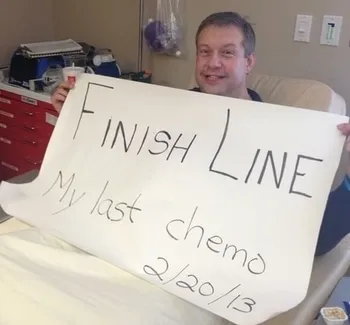Advocate Spotlight: Michael Holtz, Knoxville, Tennessee

Each month, the Cancer Policy Insitute profiles advocates who have been engaged in advocacy in their home state, their community, with elected officials, and more. This past April, Michael was named the 2018 Patient Advocate at the East Tennessee Cancer Impact Awards dinner hosted by Provision CARES Foundation. Read on to learn more about our featured advocate for the month of September and his passion to advocate for education, patient support, and policy change. If you are interested in learning more about policy, advocacy, and ways to get involved, sign up to be a part of the Grassroots Network!
Michael Holtz, Knoxville, Tennessee
Tell us a little bit about yourself.
My name is Michael Holtz. I’m a six-and-a-half-year survivor of Stage-3b rectal cancer. Since my diagnosis I have been a fierce advocate for education, patient support and policy change. I serve on the Board of Directors of the Cancer Support Community of East Tennessee, and I am the State Lead Ambassador for the American Cancer Society Cancer Action Network. When I’m not volunteering, I am Senior Communications and Marketing Specialist for Oak Ridge Associated Universities. I live in Knoxville, Tenn., with the lovely Sarah, my wife of 22 years, and our rescue dog, Marley.
How did you get connected with the Cancer Support Community?
I got connected with the Cancer Support Community during the post-surgery, pre-chemotherapy stage of cancer treatment. I saw a poster at my cancer treatment center for a survivor health program, and learned I was not yet eligible to participate. Instead, I was offered the opportunity to meet with the program director about the possibility of joining a patient support group. I also learned about and participated in a number of patient support programs, including art, cooking and mindfulness classes. After I “graduated” from the support group, I was determined to give back to the organization that played such a meaningful and important role in my recovery, which led to my being offered the opportunity to serve on the board of directors for our affiliate.
Did you have experience with advocacy in any capacity before joining CSC? (e.g. legislator meetings, hosting educational events, writing letters or calling, writing pieces for media outlets, posting on your personal Facebook, sharing information with your community, etc.)
I worked for the American Cancer Society Cancer Action Network for 12 years until the summer of 2014. Six months later I became a volunteer for the organization, so in both a professional and volunteer capacity I have participated in meetings with legislators and staff members, spoken at or organized educational events, sent emails, made calls, written letters to the editor and op/eds, used my social media presences to share advocacy messages, and so much more.
In what ways have you been involved with advocacy with CSC?
Since I became a member at our affiliate in 2012, I have advocated for CSC by representing the organization in the media as a spokesperson, by pitching stories about affiliate programs and activities, and by speaking about CSC and its programs at public events.
Our affiliate is taking baby steps toward legislative advocacy, and I’ve worked to find ways we can support efforts conducted by ACS CAN. This summer, for example, we placed a poster in support of the Palliative Care and Hospice Education and Training Act in the lobby of our affiliate and asked members and staff to sign it as a form of petition. In early August the petition was delivered to the Knoxville office of Sen. Lamar Alexander, chair of the Senate HELP Committee. His committee will begin the process of moving PCHETA through the Senate, so Alexander was a great target. We used social media platforms to publicize the drop off, which was attended by a member of the CSCET staff.
Is there one issue you are particularly passionate about?
I am especially passionate about federal research funding. There is no doubt in my mind that I am alive today because of advances in cancer research. It’s important to me that we do everything we can to make sure research bench-side funding is adequate so that cures and effective treatments can be delivered at the bed side.
What is one tip or piece of advice you’d like to share with others who are interested in becoming an advocate?
The amazing thing about becoming an advocate is that it’s really not difficult. Whether you sign a petition, send an email to or call a lawmaker, write a letter to the editor, or participate in a meeting, your story has power. And sharing your story, making your voice heard is as easy as pressing a button.
Tell us something fun about yourself—any hobbies, interests, or fun facts?
After my diagnosis I played the “cancer card” twice — once to join our church and once to adopt our rescue dog, a whip-smart and beautiful Golden Retriever-Basset Hound mix named Marley.